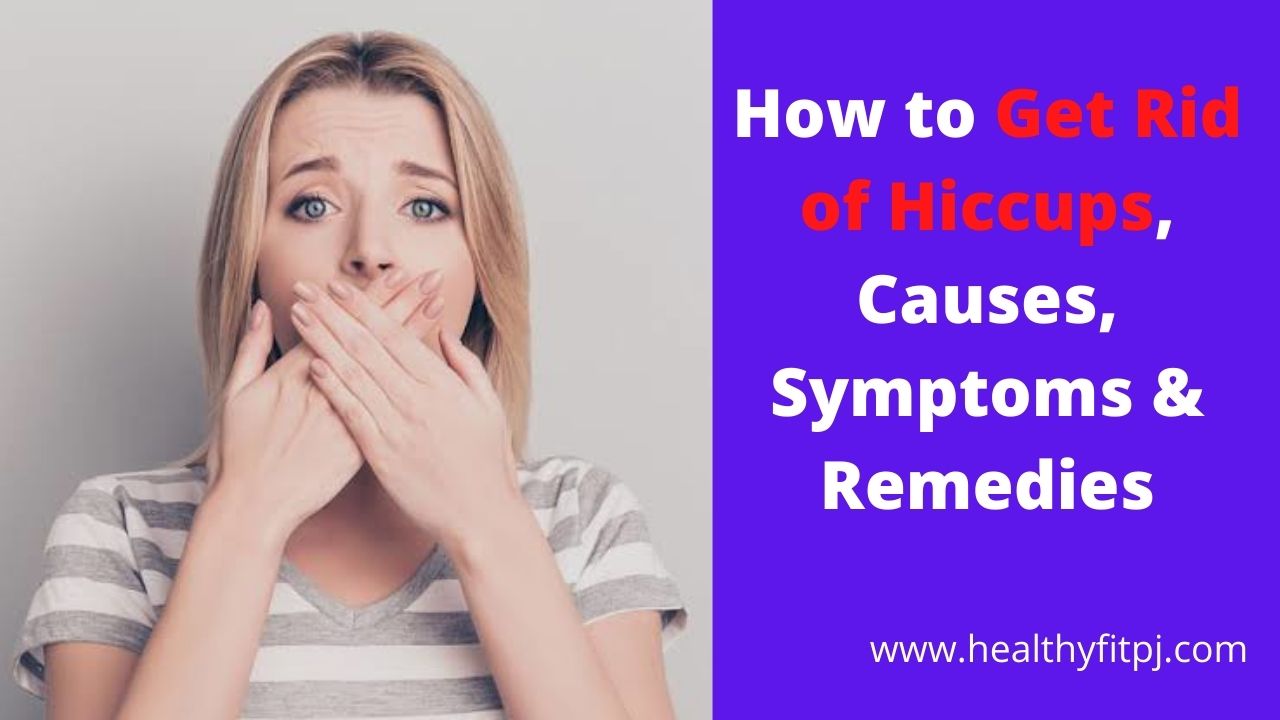Hiccups Often occur suddenly and can become annoying, and almost everyone’s had hiccups at one time. Usually, they go away on their own within a few minutes, but they can be interfering with eating and talking. So, here are some tips on how to get rid of hiccups.
There is an endless list of tricks to get of rid of hiccups, but which tricks or remedies actually work for you? There are not many studies that show the effectiveness of hiccups with different remedies or tricks.
However, all of the tricks or remedies featured are taken from public health authorities like the British National Health Service (NHS) and the Centers for Disease Control and Prevention (CDC).
Read the article till the end to learn about the most effective ways to get rid of hiccups.
- Also Read : 11 Best Natural Blood Thinners That Prevent Stroke
- Also Read : Sea Moss Health Benefits, Nutrition – How to Make Sea Moss Gel
Table of Contents
What are Hiccups
Hiccups are medically called as SDF (Synchronous Diaphragmatic Flutter) or singultus. According to physiology, a hiccups happens when the diaphragm suddenly contracts involuntarily, and at the same time your voice box contracts and your vocal folds close, effectively blocking the air flowing.
Anything while drinking carbonated drinks or overeating to swallowing air, while chewing gum can cause hiccups.
What are the Causes for Hiccups?
Most of the time, there’s often no obvious cause why we get hiccups, but there are some commonly known causes of hiccups.
Most cases, the hiccups come and go quickly. Some of the lifestyle factors that may cause hiccups.
- Eating too quickly and swallowing air along with foods
- Drinking too much or eating too much can cause hiccups
- Carbonated Drinks
- Eating spicy foods
- Being stressed
- Strong emotions, like excitement and shocking news
- Drinking alcohol
- Quick changes in temperature
- Noxious Fumes can also cause hiccups
- Some medications may also have hiccups as a side effect
How to Get Rid of Hiccups
Here are some tips and home remedies meant for short bouts of hiccups. All of these tips and home remedies are recommended by the NHS and CDC.
Breathing and Posture Tips
Here are some simple tips, while changing in your breathing and posture can relax your diaphragm.
- Hold your breath: breathe in a large gulp of air and hold the breath for about 10 to 15 second, then breathe out slowly. Try to repeat three to four times.
- Breathe into a paper bag: place a paper bag over your mouth and nose, slowly breathe in and breathe out. It is very important to not cover your head with the bag and never use a plastic bag.
- Hug Your Knees: sit down in a comfortable place on the floor. Bring your knees to the chest and hug them for 2 to 3 minutes.
- Compress your chest: gently compress your chest, it can be achieved by leaning or bending forward. That will put pressure on your diaphragm.
- Use the Valsalva maneuver: Try to exhale while pinching your nose and keep your mouth closed.
Pressure Points
Pressure points are the areas of your body that are particularly sensitive to pressure. Applying a bit of pressure to these points with your hands can help to relax your diaphragm.
- Pull on your tongue: Hold the end of the tongue in your fingers, and gently pull it forward once or twice. Pulling your tongue stimulates the nerves and eases diaphragm spasms, which may stop hiccups.
- Press on your diaphragm: the diaphragm separates your abdomen from the lungs. So, apply pressure to the area just below the end of your sternum by just using your hands.
- Squeeze your palm: use your thumb of one hand to apply pressure to the palm of your other hand.
- Place gentle pressure on each side of your nose while swallowing water.
Eating and Drinking
Changing the way you drink and eating certain foods may help you to get rid of hiccups.
- Drink ice water: Slowly drinking cold water and gargling with cold water may help stimulate the vagus nerve.
- Drink from the far side of the glass: stand up, bend over, and glass up under your chin to drink water from the far side.
- Drink water through a paper towel: cover a glass of water with a paper towel and drink through it.
- Place a few drops of vinegar in the mouth.
- Suck on an ice cube: suck on the ice cube for a 1 to 2 minutes.
- Gargle ice water: gargle ice water for about 20 to 30 seconds.
- Sip or drink very cold water slowly.
- Eat one spoonful of peanut butter or honey.
- Drink a glass of warm water very slowly without stopping to breathe.
- Suck on a lemon, try to add a bit of salt to the lemon slice.
- Place some sugar on the tongue and swallow it when it melts.
Other Remedies
- Rub the back of your neck: Rubbing the back of your neck may stimulate the phrenic nerve.
- Distract Yourself with something engaging: if you stop focusing on them, the hiccups go away on their own.
Are There Any Medications
If you have hiccups for a long time, then the doctor may prescribe medications. The following medications are known to help with hiccups.
- Baclofen: a muscle relaxant.
- Haloperidol: an antipsychotic medication.
- Metoclopramide: this medication used in the treatment of nausea.
Generally, before you take any medications, kindly talk with a doctor. And mediations will only be prescribed for long-term hiccups.
Preventing Hiccups

Some common cases of hiccups may be triggered by lifestyle factors. Also, make changes in your habits, here are some things that you can try to prevent them.
- Eat slower
- Eat smaller portion
- Reduce drinking alcohol
- Avoid carbonated drinks
- Avoid spicy foods
- Practice relaxation techniques
- Reduce stress
When Should I See My Doctor for hiccups?
Most cases of hiccups resolve themselves within a few minutes or hours. If you’re regularly getting hiccups or have hiccups that last for two days or if they disturb you while eating and sleeping, then immediately talk with your doctor. Because your hiccups may sign of an underlying condition like:
- Stroke
- Multiple sclerosis
- Gastroesophageal reflux
QNA’s on Hiccups
-
Are Hiccups Bad?
Usually, hiccups are harmless and resolve by themselves within a few minutes. In some cases, prolonged hiccups that last for a day or a long time may lead to underlying conditions. So, in this case you need to talk with a doctor, they will help medications to stop them.
-
How Can Hiccups in Infants and Babies be Stopped?
The infants and babies can get hiccups easily and generally there is no concern. If hiccups happen during feeding, then immediately stop feeding until the hiccups go away.
Usually, the hiccups will go away in an infant or babies, you can try to change the position of the baby or infant. If your baby often gets hiccups, contact your pediatrician or doctor.
-
Do Hiccups Have a Purpose?
The reason why human’s hiccups have baffled scientists for many more years, not least because it does not seem to serve any useful purpose. The hiccups are sudden contractions of the muscles used for breathing in
Conclusion
Almost everyone had hiccups at one time, which usually go away on their own within a few minutes, they can interfere with talking and eating. If you’re regularly getting hiccups or have hiccups that last more than one day, then talk with a doctor because your hiccups could be a sign of underlying condition.
Hopefully, you like this article, if you have any questions and suggestions kindly put them in the comment box below.
You’ll also like:
